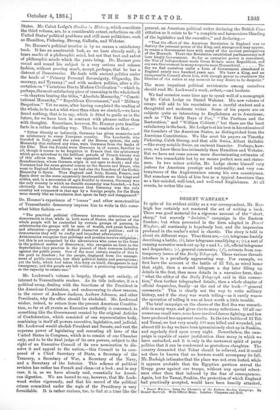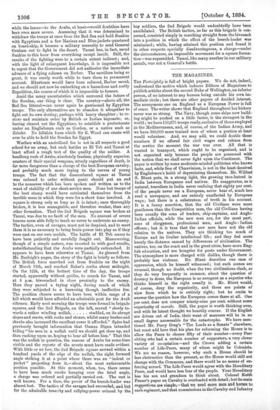DESERT WARFARE.*
IN spite of his evident ability as a war correspondent, Mr. Bur- leigh has certainly not mastered the art of writing a book.
There was good material for a vigorous account of the "short, sharp," but scarcely "decisive," campaign in the Eastern Soudan ; but when presented in the form adopted in Desert Was fare, all continuity is hopelessly lost, and the impression
produced in the reader's mind is chaotic. The story is told in about six different ways. Thus there are,—(a), telegrams hastily describing a battle; (b), later telegrams amplifying a; (c), a sort of running narrative much cut up by a and b; (d), official telegrams and despatches ; (e), general comments; (f), extracts from con- temporary issues of the Daily Telegraph. These various threads interlace in a peculiarly aggravating way. For example, we
first have the account of the battle of El Teb, as wired home that night, then a second telegram a day later filling up details in the first, then more details in a narrative form, then "what the editor of the Daily Telegraph said in this connec- tion," then further telegraphed details, then a whole chapter of official despatches, finally—at the end of the book—" general comments." This is clearly not the way to write military history, and if the story was worth telling—as it surely was— the operation of telling it was at least worth a little trouble.
The brief campaign on the shores of the Red Sea was remark- able in many ways, and gives rise to many reflections. Of all our numerous small wars, none have involved fiercer fighting, and few have produced less apparent results. lathe two battles of El Teb
and Tamai, we lost very nearly 400 men killed and wounded, yet almost till to-day we have been ignominiously shut up in Suakim,
and regularly fired upon every night. Nevertheless, the cam- paign is capable of easier justification than many.in which we have embarked, and it is only in the narrowest spirit of party politics that it can be condemned as gratuitous slaughter. The country demanded that Tokar should be relieved, and it could not then be known that no horrors would accompany its fall.
Mr. Burleigh intimates that the place was not even looted, while it appears probable that the Egyptian garrison served the Krupp guns against our troops, without any special reluct-
ance other than that induced by the fear of consequences. Again, but for Tamai, Suakim, the protection of which England had practically accepted, would have been heavily attacked,
• Desert Warfare: being the Chronicle of the Eastern SOUdillt Campaign. BY Bennet Burieth. With Official Maps. London : Chapman and Hall. while the losses—to the Arabs, at least—would doubtless have been even more severe. Assuming that it was determined to withdraw the troops at once from the Red Sea and hold Suakin with Egyptians and a few Marines and Blue-jackets quartered on board-ship, it became a military necessity to send General Graham out to fight in the desert. Tamai has, in fact, saved Suakim to this hour from everything except insult. Still, the results of the fighting were to a certain extent indirect; and, with the light of subsequent knowledge, it is impossible not to regret that the Government did not authorise the immediate advance of a flying column on Berber. The sacrifices being so great, it was surely worth while to tarn them to permanent account. Khartoum would have been relieved, Berber saved, and we should not now be embarking on a hazardous and costly Expedition, the course of which it is impossible to foresee.
Amid the many uncertainties which surround the future of the Soudan, one thing is clear. The country—above all, the Red Sea littoral—can never again be garrisoned by Egyptian troops. The only alternatives are to abandon it altogether to fight out its own destiny, perhaps with heavy slaughter ; to re- store and maintain order by British or Indian bayonets; or, having cleared out the Egyptians, to establish a protectorate under an Englishman such as Gordon, or a native such as Zebehr. No fellahin force which Sir E. Wood can create will ever be able to hold the Soudan for Egypt.
Warfare with an uncivilised foe is not in all respects a good school for an army, but such battles as El Teb and Tamai at least afford a rough test of the quality of the soldier. A headlong rush of Arabs, absolutely fearless, physically superior, masters of their special weapons, utterly regardless of death, is far more dangerous than a charge of the best European cavalry, and probably much more trying to the nerves of young troops. The fact that the dismembered square at Tamai was reduced to order without panic should put an end to the nonsense which has been spoken and written as to the want of stability of our short-service men. None but troops of the best stamp would have extricated themselves from the terrible mess in which they were for a short time involved. A square is strong only as long as it is intact ; once thoroughly broken, it is less manageable, and therefore weaker, than any other formation. That the 2nd Brigade square was broken at Tamai, was due to no fault of the men. No amount of severe lessons seem able fully to teach us never to underrate an enemy. The tactics, even of savages, must not be despised, and to meet them it is as necessary to bring brain-power into play as if they were cast on our own models. The battle of El Teb seems to have been patiently and carefully fought out. Manceuvring, though of a simple nature, was resorted to with good results, notwithstanding that the Arabs were partially entrenched. It appears to have been otherwise at Tamai. As gleaned from Mr. Burleigh's pages, the story of the fight is briefly as follows. The British force marched out from Suakim on the night of March 11th, and reached Baker's zeriba about midnight. On the 12th, at the hottest time of the day, the troops started, apparently without guides, to search for Tamai, and at 4 p.m. bivouacked in close proximity to the enemy. Here they passed a trying night, during much of which they were subjected to a harassing though ineffective fire. The position chosen seems to have been within range of a hill which would have afforded an admirable post for the Arab riflemen. Early next morning the troops were formed in brigade squares, and the 2nd Brigade, on the left, moved "slowly to- wards a rather winding nullah studded, on its abrupt slopes and crests, with rocks and stones, whilst many bushes and shrubs also increased the excellent cover it afforded." Spies had previously brought information that Osman Digna intended hiding "his men in a nullah until we should get close up, and then rushing upon us, hoping to bear all before him." That this was the nullah in question, the masses of Arabs for some time visible and the reports of the scouts must have made evident. With little or no loss, the 2nd Brigade square arrived within a hundred yards of the edge of the nullah, the right forward angle striking it at a point where there was an "indent or pocket" projecting from it,—about the most unfavourable position possible. At this moment, when, too, there seems to have been much smoke hanging over the fated angle, a charge was ordered and partially carried out. The rest is well known. For a time, the power of the breech-loader was almost lost. The tactics of the savages had succeeded, and but f OY the admirable tenacity and rallying-power evinced by the boy soldiers, the 2nd Brigade would undoubtedly have been annihilated. The British tactics, as far as this brigade is con- cerned, consisted simply in marching straight from the bivonack into a position in which the effect of the breech-loader was minimised; while, having attained this position and found it in other respects specially disadvantageous, a charge—under the circumstances, an impossible movement for a square forma- tion—was superadded. Tamai, like many another in our military annals, was not a General's battle.















































 Previous page
Previous page